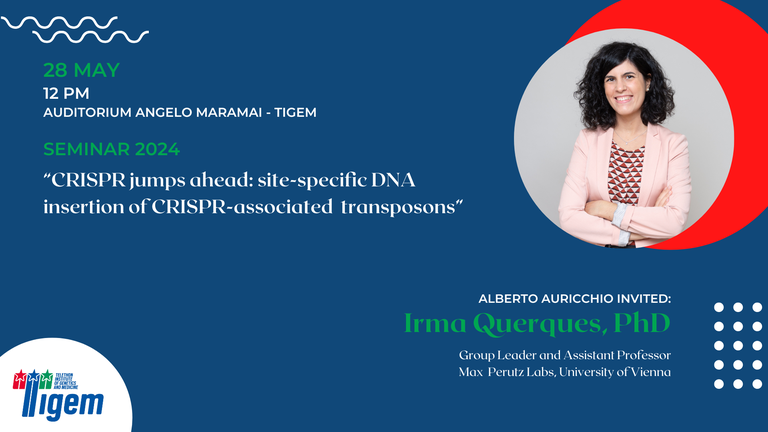Irma Querques, PhD - "CRISPR jumps ahead: site-specific DNA insertion of CRISPR-associated transposons"
- When May 28, 2024 from 12:00 PM to 01:15 PM (Europe/Berlin / UTC200)
- Where Tigem, Auditorium Angelo Maramai
- Contact Name Alberto Auricchio
- Contact Phone 08119230659
-
Add event to calendar
iCal

- https://www.tigem.it/newsroom/seminars/irma-querques-phd-crispr-jumps-ahead-site-specific-dna-insertion-of-crispr-associated-transposons
- Irma Querques, PhD - "CRISPR jumps ahead: site-specific DNA insertion of CRISPR-associated transposons"
- 2024-05-28T12:00:00+02:00
- 2024-05-28T13:15:00+02:00
Irma Querques, PhD
Group Leader
Assistant Professor
Max Perutz Labs
University of Vienna
Short CV
Abstract
Several Tn7-like transposons co-opted CRISPR-Cas machineries to direct transposon DNA insertion into target sites specified by CRISPR RNAs
(crRNAs). Due to their RNA-guided DNA integration activity, CRISPR-associated transposons (CASTs) hold great promise as programmable, site-specific gene insertion tools. We employed an integrative structure-function approach to investigate type V CASTs that rely on the pseudonuclease Cas12k, the transposase TnsB, the zinc-finger protein TniQ and the ATPase TnsC. Focused on the CRISPR-Cas12k complex and the TnsC protein filament, our research explored guide RNA arrangement, interaction with target DNA, and RNA minimization strategies. We discovered that the TnsC filament assembly induces structural changes in bound DNA, enhancing our understanding of the molecular interplay between CRISPR and transposons. In most recent work, our research delved deeper into the structural basis of RNA-mediated DNA insertion in type V CASTs and revealed an unprecedented interaction between the CRISPR machinery and the ribosomal protein S15. We uncovered a novel moonlighting role of S15 in
prokaryotic biology beyond its traditional involvement in ribosome assembly. S15 was thus identified as an essential regulatory component of type V CASTs. This discovery's implications for genome editing were substantial, leading to the reconstitution of these systems in human cells. Altogether, our studies uncover key mechanistic aspects of RNA-guided DNA transposition and offer prospects for repurposing CASTs as next-generation genome editing tools for targeted DNA insertion.
Group Leader
Assistant Professor
Max Perutz Labs
University of Vienna
Short CV
Abstract
Several Tn7-like transposons co-opted CRISPR-Cas machineries to direct transposon DNA insertion into target sites specified by CRISPR RNAs
(crRNAs). Due to their RNA-guided DNA integration activity, CRISPR-associated transposons (CASTs) hold great promise as programmable, site-specific gene insertion tools. We employed an integrative structure-function approach to investigate type V CASTs that rely on the pseudonuclease Cas12k, the transposase TnsB, the zinc-finger protein TniQ and the ATPase TnsC. Focused on the CRISPR-Cas12k complex and the TnsC protein filament, our research explored guide RNA arrangement, interaction with target DNA, and RNA minimization strategies. We discovered that the TnsC filament assembly induces structural changes in bound DNA, enhancing our understanding of the molecular interplay between CRISPR and transposons. In most recent work, our research delved deeper into the structural basis of RNA-mediated DNA insertion in type V CASTs and revealed an unprecedented interaction between the CRISPR machinery and the ribosomal protein S15. We uncovered a novel moonlighting role of S15 in
prokaryotic biology beyond its traditional involvement in ribosome assembly. S15 was thus identified as an essential regulatory component of type V CASTs. This discovery's implications for genome editing were substantial, leading to the reconstitution of these systems in human cells. Altogether, our studies uncover key mechanistic aspects of RNA-guided DNA transposition and offer prospects for repurposing CASTs as next-generation genome editing tools for targeted DNA insertion.
